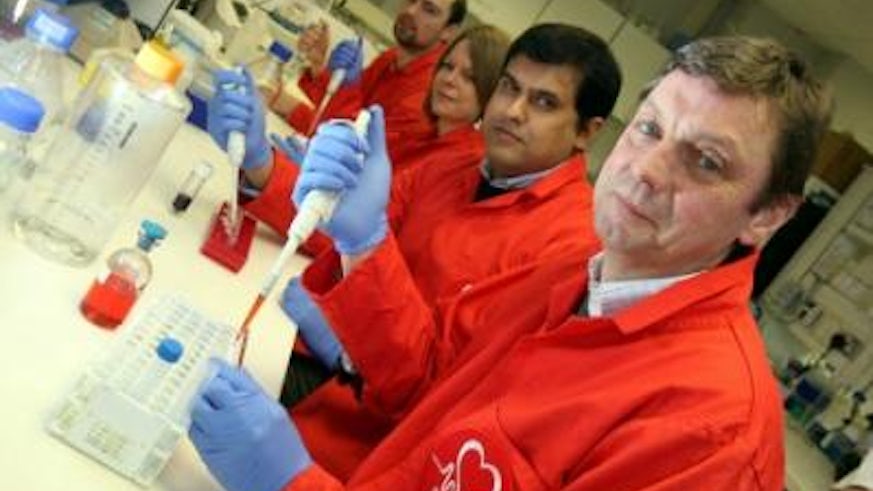Researchers ‘Go Red’ for Heart Month
6 February 2015

University researchers will be making a colourful change this month as they swap their white lab coats for bright red in support of the British Heart Foundation's campaign, 'Wear it' Beat it'.
One scientist, an ardent England rugby fan, has even agreed to wear the red of Wales for the day in support of the campaign.
The month of February is Heart Month and on 6 February, the British Heart Foundation is asking the nation to join the fight and show their support by wearing red and hosting an event to fund lifesaving heart research.
Heart and cardiovascular disease is currently the biggest killer in Wales. Thanks to invaluable support from the British Heart Foundation, University research into these diseases currently stands at the forefront. Its aim is to understand the causes of a range of inherited and acquired cardiovascular diseases and to use this knowledge to improve the treatment of people with these conditions.
Professor Alan Williams said:" Since 2007, the British Heart Foundation has provided more than £10m towards cardiovascular research. The money has been used to fund ground-breaking research.
"The work of my group is focused on understanding how the normal rhythm of the heart is controlled, how this rhythm is disrupted in heart disease, and contributing to the development of new and improved therapies for people with heart conditions that will lead to improved quality of life."
People like Dawn Bell, 44, who was born with a heart condition and, as a child, had to undergo open-heart surgery. Dawn suffered a cardiac arrest two years ago following an earlier diagnosis of heart failure when she was 33 years old. Her heart can go into a dangerous heart rhythm at any time. Research by Professor Williams and his team are centered on how normal heart rhythm is maintained in the individual cells that make up the heart. By studying the processes involved, Professor Williams hopes to come up with new treatments for heart rhythm problems to prevent people having a potentially deadly cardiac arrest like Dawn did.
More than 90 scientists and clinicians carry out cardiovascular research in the Wales Heart Research Institute. Some of this research involves investigating the impact of inflammation on heart and cardiovascular disease as Prof Valerie O'Donnell explains:
"At Cardiff University we research inflammation (the body's response to infection and trauma) and the role played by active lipids (fats) that are released in response to injury and infection in cardiovascular disease. Since 2007 we have discovered many new lipids that stimulate blood clotting and activate white cells, and are now researching how these participate in cardiovascular disease. Inflammation is a major cause of vascular disease, thrombosis, heart attack and stroke.
"Our research spans both basic science and clinical studies. Working in direct partnership with NHS colleagues at the University Hospital of Wales, we are making real progress in our knowledge of this area and ultimately improving the treatment of people with heart and circulatory disease.
"Our research is made possible by generous support from the British Heart Foundation, allowing us to focus directly on bridging the gap between scientist and front-line clinician."
One-in-four deaths in Wales each year can be attributed to heart and circulatory disease. It is responsible for almost 160,000 deaths in the UK each year, an average of 440 people each day. There are currently 7 million people in the UK living with heart and circulatory disease.
Delyth Lloyd, British Heart Foundation Cymru, said: "Wear it. Beat it is a fantastic opportunity for everyone to come together in Heart Month to fight against heart and circulatory disease. Our fundraising activity helps to support cutting-edge research such as the work done being done at the University Hospital for Wales. Every pound raised will help make a massive difference to the millions of people living with these conditions."
